| Panzerhaubitze 2000 | |
|---|---|
.jpg.webp) Panzerhaubitze 2000 from the front | |
| Type | Self-propelled gun |
| Place of origin | Germany |
| Service history | |
| In service | 1998–present |
| Used by | See Operators |
| Wars | War in Afghanistan (2001–2021) Russian invasion of Ukraine |
| Production history | |
| Designed | 1987–1995 |
| Unit cost | \€17 million (2022)[1] |
| Produced | 1995–present |
| Specifications | |
| Mass | Combat: 55.8 t (61.5 short tons) |
| Length | 11.7 m (38 ft 5 in) |
| Width | 3.6 m (11 ft 10 in) |
| Height | 3.1 m (10 ft 2 in) |
| Crew | 5 (commander, driver, gunner, and two loaders) |
| Rate of fire | 3 rounds in 9 seconds (burst) 10 rounds per minute |
| Effective firing range | DM121 Boattail: 30 km (19 mi) M1711 base bleed: 40 km (25 mi) M2005 V-LAP (RAP): 54 km (34 mi) |
| Armor | Welded steel, 14.5 mm resistant Additional bomblet protection |
Main armament | Rheinmetall 155 mm L52 Artillery Gun 60 rounds |
Secondary armament | 7.62 mm Rheinmetall MG3 machine gun |
| Engine | MTU 881 Ka-500 1,000 PS (986 hp, 736 kW) |
| Power/weight | 17.92 PS/t |
| Suspension | Torsion bar |
Operational range | 420 km (260 mi) |
| Maximum speed | Road: 67 km/h (41 mph) Off-road: 45 km/h (28 mph) |
The Panzerhaubitze 2000 (German pronunciation: [ˈpant͡sɐhaʊ̯ˌbɪt͡sə t͡svaɪ̯ˈtaʊ̯zn̩t]), meaning "armoured howitzer 2000"[2] and abbreviated PzH 2000, is a German 155 mm self-propelled howitzer developed by Krauss-Maffei Wegmann (KMW) and Rheinmetall in the 1980s and 1990s for the German Army. The PzH 2000 has automatic support for up to five rounds of multiple round simultaneous impact. Replenishment of shells is automated. Two operators can load 60 shells and propelling charges in less than 12 minutes. The PzH 2000 equips the armies of Germany, Italy, Ukraine, Netherlands, Greece, Lithuania, Hungary, Qatar and Croatia, mostly replacing older systems such as the M109 howitzer. In November 2019, a PzH 2000 L52 gun fired a shell a distance of almost 67 km.[3] As of 2020, a prototype L52 gun with a new charge is being tested for a range of at least 75 km.[4]
Development
In 1986, Italy, the United Kingdom and Germany agreed to terminate their existing development of the PzH 155-1 (SP70) programme, which had run into reliability problems and had design defects, notably being mounted on a modified tank chassis. German industry was asked for proposals to build a new design with a gun conforming to the JBMOU. Of the proposed designs, Wegmann's was selected.
Design
.jpg.webp)
Rheinmetall designed the 155 mm 52-calibre JBMOU compliant rifled gun (60-rifles, right-hand spiral), which is chromium-lined over its entire 8 m length and includes a muzzle brake on the end. The gun uses a new modular charge system with six charges (five identical), which can be combined to provide the optimal total charge for the range to the target, as well as the conventional bagged charge systems. Primer is loaded separately via a conveyor belt, and the entire loading, laying and clearing are completely automated.
The maximum range of the gun with standard issue DM92 propellant charges is 30 km with the standard DM121 boattail round, 40 km with base bleed rounds, and 54 km with M2005 V-LAP rocket-assisted projectile.[5] With Rheinmetall's ERC (Extender Range Charge, previously known as the Top Charge) high pressure unitary charge, the range is 36 km with DM121 BT round, 47 km with M0121 BB round and 67 km with the M2005 V-LAP RAP.[6][7] The gun can also fire the SMArt 155 artillery round used by Germany and Greece.
Wegmann supplied both the chassis, sharing some components with the Leopard 2, and the turret for the gun. The system has superb cross-country performance because of its use of continuous tracks and considerable protection in the case of counter-fire. The turret includes a phased array radar on the front glacis for measuring the muzzle velocity of each round fired. Laying data can be automatically provided via encrypted radio from the battery fire direction centre.
A lighter, more air-portable version developed by KMW and called the Artillery Gun Module uses the gun in a module fitted to a lighter chassis.
In December 2013, Raytheon and the German Army completed compatibility testing for the M982 Excalibur extended range guided artillery shell with the PzH 2000. Ten Excaliburs were fired at ranges from 9 to 48 km. Shells hit within 3 m of their targets, with an average miss distance of 1 m at 48 km. The Excalibur was accepted by the German Army in 2014.[8]
A PzH 2000 L52 gun fired a shell 67 km at the Alkantpan test range in South Africa on 6 November 2019.
In 2021, Germany and the Netherlands agreed to jointly define & execute a Mid-Life Update to the operational Pzh2000 in their inventories and ensure standardisation and availability.
Combat record and alterations

The PzH 2000 was used for the first time in combat by the Fire Support Command of the Royal Netherlands Army in August 2006 against Taliban targets in Kandahar Province, Afghanistan, in support of Operation Medusa.[9] It was then used regularly in support of coalition troops in Uruzgan province. The PzH 2000 was also used extensively during the Battle of Chora. It was known as "the long arm of ISAF" and proved to be accurate and effective. However, the gun was criticised by the Dutch in Uruzgan province as the NBC system, designed for use in Europe, could not cope with the high level of dust in Afghanistan.
The guns have been modified with additional armor being fitted to the roof to protect against mortar rounds. There have been reports of other problems, including the need to keep it in the shade unless actually firing, the damage done when traveling on poorly built roads, and a significant 'cold gun' effect necessitating the use of 'warmers'.
Starting in June 2010 as a result of the Good Friday Battle, German ISAF troops at PRT Kunduz had three PzH 2000s at their disposal. They were first used on 10 July 2010 to provide support for the recovery of a damaged vehicle. This was the first time in its history that the Bundeswehr has used heavy artillery in combat.[10] The PzH 2000 also played a key role during Operation Halmazag in November 2010, when the villages of Isa Khel and Quatliam were retaken from the Taliban by German paratroopers.[11]
War in Ukraine
On 21 June 2022, twelve PzH 2000s were deployed to Ukraine; seven came from Germany and five from the Netherlands.[12] After a couple of weeks of intensive use, the guns required repairs, and error messages were being displayed as they are designed and built to fire no more than 100 shots a day.[13] Germany considers 100 shots per day "a high-intensity mission". Ukraine has consistently exceeded this number, placing stress on the loading mechanism. Ukraine also fired "special ammunition at too great a distance." The Bundeswehr sent spare parts and a repair facility in Lithuania was chosen to repair the weapons.[14] This came as Ukraine and KMW entered into a 1.7 billion euro deal to purchase 100 PzH 2000s.[15]
Russian state news agency TASS reported that a PzH 2000 was destroyed by Russian forces in Kherson Oblast on 30 October 2022.[16] The open-source intelligence site Oryx reported one visually confirmed damaged PzH 2000.[17]
Due to the intensity of artillery fire on the battlefield, Lithuania undertook to repair twelve of the howitzers,[18] finishing repair work on six by December 2022. By this time, the number of PzH 2000s sent to Ukraine rose to twenty-two; fourteen from Germany and eight from the Netherlands.[19] As of February 2023, fifteen of the howitzers were waiting to be repaired in Slovakia, but were being held up at the border for several weeks due to legal issues.[20][21]
The barrels of the PzH 2000 had according to the Rheinmetall CEO Armin Papperger an expected lifetime of around 4,500 shots. But to the surprise of the manufacturer the barrels of the PzH 2000 have achieved in Ukraine a shot count of up to 20,000.[22]
Operators
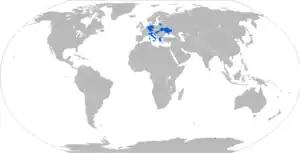

 Croatia: 16 ordered (second-hand from Germany);[23] 12 to be modernized and overhauled, 3 for spare parts, 1 for training. Total value of the contract was 55 million euros.[24] The first PzH 2000 was delivered on 29 July 2015.[25] Agreement for the procurement was signed in 2014, deliveries were to take place between 2015 and 2016, howitzers to be introduced in service by 2019.[26]
Croatia: 16 ordered (second-hand from Germany);[23] 12 to be modernized and overhauled, 3 for spare parts, 1 for training. Total value of the contract was 55 million euros.[24] The first PzH 2000 was delivered on 29 July 2015.[25] Agreement for the procurement was signed in 2014, deliveries were to take place between 2015 and 2016, howitzers to be introduced in service by 2019.[26] Germany: 185 delivered between 1998 and 2002.[27] Fourteen units (7+3+4) were sent to Ukraine by October 2022.[28] 16 sold to Croatia and 21 to Lithuania. 108 to remain in active service.[23] Germany ordered 12 additional ones in May 2023 + an option for 16. The delivery will start in 2025.[29] €190.7 million for the 12 PzH 2000 ordered in 2023
Germany: 185 delivered between 1998 and 2002.[27] Fourteen units (7+3+4) were sent to Ukraine by October 2022.[28] 16 sold to Croatia and 21 to Lithuania. 108 to remain in active service.[23] Germany ordered 12 additional ones in May 2023 + an option for 16. The delivery will start in 2025.[29] €190.7 million for the 12 PzH 2000 ordered in 2023 Greece: 25 ordered in 2001 and delivered between 2003 and 2004.[27]
Greece: 25 ordered in 2001 and delivered between 2003 and 2004.[27] Hungary: 24 were ordered in December 2018.[30][31] As of December 2022, 10 were delivered.[32]
Hungary: 24 were ordered in December 2018.[30][31] As of December 2022, 10 were delivered.[32] Italy: 70 ordered in 2002 and delivered between 2004 and 2008.[33] 2 pre-production models were retired.
Italy: 70 ordered in 2002 and delivered between 2004 and 2008.[33] 2 pre-production models were retired. Lithuania: 21 delivered between 2015 and 2022. 17 active, 3 for spare parts, and 1 for training.[34][35]
Lithuania: 21 delivered between 2015 and 2022. 17 active, 3 for spare parts, and 1 for training.[34][35] Netherlands: 57 ordered in 2002. Prior to the war in Ukraine, 33 were in storage, 18 in active service, and 6 used for training. Now, 46 to be modernised by 2024.[36][37] In 2022, 5+3 were sent to Ukraine.
Netherlands: 57 ordered in 2002. Prior to the war in Ukraine, 33 were in storage, 18 in active service, and 6 used for training. Now, 46 to be modernised by 2024.[36][37] In 2022, 5+3 were sent to Ukraine. Qatar: 24 ordered in 2013,[38] first three delivered in 2015[39]
Qatar: 24 ordered in 2013,[38] first three delivered in 2015[39] Ukraine: 28 delivered.[40] During the Russian invasion of Ukraine, it was announced on 20 April 2022 that five Dutch PzH 2000s would be transferred to Ukraine, with ammunition and training to be provided by Germany.[41] On 6 May, it was announced that Ukraine would receive seven units from German army stocks which were undergoing maintenance.[42] On 7 May, Chancellor Olaf Scholz agreed to supply the ammunition required, straight from industry to Ukrainian forces, without having to go through the German government for approval in the future.[43] Training of Ukrainian artillery crews started on 11 May 2022 at the Bundeswehr's artillery school in Idar-Oberstein.[44] On 21 June, Ukrainian Minister of Defence Oleksii Reznikov announced that the first PzH 2000s had entered Ukrainian service.[45] Der Spiegel reported on 27 July that Germany had agreed to sell 100 more PzH 2000s to Ukraine.[46] By this time, many PzH 2000 ammo loading mechanisms had broken down due to considerable strain: while the PzH 2000 is designed to fire 100 shells per day, the Ukrainians likely fired the gun much more often. In addition to shipping necessary spare parts to Ukraine, the German government was negotiating the creation of a repair center for its equipment in Poland.[47] In October 2022, the howitzers were sent to Lithuania because Poland denied the German request for exclusive access to the Huta Stalowa Wola facilities, as it would halt all production in the factory (HSW manufactures and services Krab SPGs for Poland and Ukraine, among other weapon systems).[48] Eventually, a planned repair center in Slovakia will shorten the route to and from the war zone in Ukraine.
Ukraine: 28 delivered.[40] During the Russian invasion of Ukraine, it was announced on 20 April 2022 that five Dutch PzH 2000s would be transferred to Ukraine, with ammunition and training to be provided by Germany.[41] On 6 May, it was announced that Ukraine would receive seven units from German army stocks which were undergoing maintenance.[42] On 7 May, Chancellor Olaf Scholz agreed to supply the ammunition required, straight from industry to Ukrainian forces, without having to go through the German government for approval in the future.[43] Training of Ukrainian artillery crews started on 11 May 2022 at the Bundeswehr's artillery school in Idar-Oberstein.[44] On 21 June, Ukrainian Minister of Defence Oleksii Reznikov announced that the first PzH 2000s had entered Ukrainian service.[45] Der Spiegel reported on 27 July that Germany had agreed to sell 100 more PzH 2000s to Ukraine.[46] By this time, many PzH 2000 ammo loading mechanisms had broken down due to considerable strain: while the PzH 2000 is designed to fire 100 shells per day, the Ukrainians likely fired the gun much more often. In addition to shipping necessary spare parts to Ukraine, the German government was negotiating the creation of a repair center for its equipment in Poland.[47] In October 2022, the howitzers were sent to Lithuania because Poland denied the German request for exclusive access to the Huta Stalowa Wola facilities, as it would halt all production in the factory (HSW manufactures and services Krab SPGs for Poland and Ukraine, among other weapon systems).[48] Eventually, a planned repair center in Slovakia will shorten the route to and from the war zone in Ukraine.
Summary
| Operators as of April 2023 | Ordered new | Delivered | Bought 2nd hand [ + ] Sold 2nd hand [ - ] |
Received [ + ] Donated [ - ] |
Owned |
|---|---|---|---|---|---|
| 197 | 185 | - 37 | - 14 | 134 | |
| – | – | + 16 | – | 16 | |
| 25 | 25 | – | – | 25 | |
| 24 | 23 | – | – | 23 | |
| 70 | 70 | – | - 6 | 64 | |
| – | – | + 21 | – | 21 | |
| 57 | 57 | – | - 8 | 49 | |
| 24 | 24 | – | – | 24 | |
| 100[49][50] | – | – | + 28 | 28 | |
| Total | 497 | 384 | 0 | 0 | 384 |
Exports
A number of armies have tested the PzH 2000 system; its ability to provide accurate fire at 40 km has been a major selling point.
The PzH 2000 was considered for the US Army's Crusader concept system, but several requirements of the Crusader made it unsuitable. The Crusader specifications placed the crew and gun in separate compartments, allowing a single highly armoured crew compartment to control the firing of an entire battery of guns through intervehicle links. In addition, the Crusader included an automated ammunition tender, and an active cooled barrel.[51]
The PzH 2000 was a contender for Phase 1C of Australia's Land 17 Artillery Replacement Programme, until that phase of the project was cancelled in May 2012.[52]
Finland tested a PzH 2000 alongside the 155mm SpGH ZUZANA and AS-90 "Braveheart". Tests ended in 1998; more of the cheaper 155 K 98 field guns were bought instead of self-propelled systems.[53]
The German Navy evaluated a modified system known as MONARC for installation onboard frigates; while the system performed well, components were difficult to protect against corrosion. Sweden evaluated a slightly modified version, but selected the Archer Artillery System instead.
In December 2018, Hungary ordered 24 new-build PzH 2000s from Krauss-Maffei Wegmann, along with 44 Leopard 2A7+ and 12 Leopard 2A4 main battle tanks, in a deal valued at over 160 billion HUF (USD $565 million).[30][31]
In June 2022, Germany and the Netherlands authorized the transfer of twelve Panzerhaubitze 2000s to the Armed Forces of Ukraine; the first was received on 21 June.[54]
In September 2022, Germany announced the handover of four additional PzH 2000s to the Ukrainian Armed Forces.[55]
Similar vehicles
- AS-90 – British 155 mm self-propelled howitzer
- Bandkanon 1C – Swedish 155 mm self-propelled howitzer
- 2S35 Koalitsiya-SV – Russian 152 mm self-propelled artillery, derived from Msta
- 2S19 Msta – Soviet/Russian 152 mm self-propelled howitzer, Msta S M K and other related
- Type 99 155 mm self-propelled howitzer – Japanese artillery
- M109 howitzer – American 155 mm self-propelled howitzer
- GCT 155mm – French 155 mm self-propelled howitzer
- K9 Thunder – South Korean self-propelled 155 mm howitzer
- AHS Krab – Polish 155 mm self-propelled howitzer
- T-155 Fırtına – Turkish 155 mm self-propelled howitzer
- PLZ-05 – Chinese 155 mm self-propelled howitzer
- SSPH Primus – Singaporean 155 mm self-propelled howitzer
- Sholef – Israeli 155 mm self-propelled howitzer
Gallery
 Dutch howitzer being transported to Afghanistan
Dutch howitzer being transported to Afghanistan Dutch PzH-2000 firing on targets in Chora. June 16, 2007
Dutch PzH-2000 firing on targets in Chora. June 16, 2007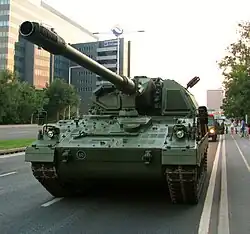 Croatian PzH 2000 at Zagreb Military Parade
Croatian PzH 2000 at Zagreb Military Parade.jpg.webp) Remote firing of the PzH 2000 by a German Army soldier in Kunduz, Afghanistan (July 2010)
Remote firing of the PzH 2000 by a German Army soldier in Kunduz, Afghanistan (July 2010) Ammunition
Ammunition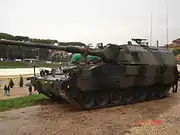 Italian Pzh-2000 on display at Rome's Circus Maximus for the 2009 Army Day
Italian Pzh-2000 on display at Rome's Circus Maximus for the 2009 Army Day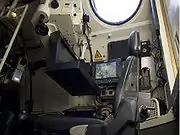 Interior view of an Italian Pzh-2000
Interior view of an Italian Pzh-2000.jpg.webp) German soldiers with 4th Battery, 131st Artillery Battalion carry out a fire mission with self propelled howitzers.
German soldiers with 4th Battery, 131st Artillery Battalion carry out a fire mission with self propelled howitzers.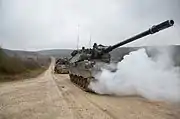 Dutch soldiers of Bravo Battery, Fire Support Battalion drive Panzerhaubitze 2000 into a simulated ambush.
Dutch soldiers of Bravo Battery, Fire Support Battalion drive Panzerhaubitze 2000 into a simulated ambush._photo-006.JPG.webp) Panzerhaubitze 2000 engine
Panzerhaubitze 2000 engine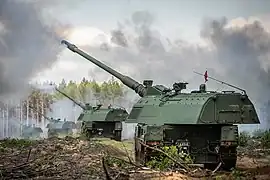 Lithuanian PzH 2000 unit during exercises (August, 2022)
Lithuanian PzH 2000 unit during exercises (August, 2022)
See also
References
- ↑ "KMW from Germany offers Ukraine to purchase 100 PZH 2000 155mm howitzers | Defense News April 2022 Global Security army industry | Defense Security global news industry army year 2022 | Archive News year".
- ↑ "Krauss-Maffei Wegmann – PZH 2000 – Ihr Partner rund um Wehrtechnik". Kmweg.com. Archived from the original on 28 October 2007. Retrieved 20 July 2022.
- ↑ "Rheinmetall sets three new distance records for indirect fire in South Africa". edrmagazine.eu. 27 November 2019. Retrieved 4 May 2023.
- ↑ "Rheinmetall develops new long-range howitzer". Janes.com. Retrieved 28 July 2022.
- ↑ "155mm Artillery Modular Charge System" (PDF).
- ↑ "Extended Range Charge for 155mm artillery".
- ↑ Valpolini, Paolo (27 November 2019). "Rheinmetall sets three new distance records for indirect fire in South Africa". EDR Magazine. Retrieved 28 November 2023.
- ↑ German Army PzH 2000 Howitzer Test Fires Excalibur 155mm Artillery Projectile Archived 10 August 2014 at the Wayback Machine - Deagel.com, 10 December 2013
- ↑ "Krauss-Maffei Wegmann – Ihr Partner rund um Wehrtechnik". Archived from the original on 28 September 2007. Retrieved 2 March 2007.
- ↑ Bundeswehr setzt erstmals schwere Artillerie ein Archived 5 December 2013 at the Wayback Machine. Hamburger Abendblatt, 12 July 2010
- ↑ Der Kampf um Quatliam Archived 4 December 2013 at the Wayback Machine, by David Schraven (in German)
- ↑ "First heavy weapons from Germany arrive in Ukraine". www.dw.com. 21 June 2022. Retrieved 22 June 2022.
- ↑ Gelieferte Panzerhaubitzen müssen schon repariert werden, FAZ, 29 July 2022.
- ↑ "Lithuania Has Repaired PzH 2000 Howitzer and Returning Them to Service of Ukraine's Armed Forces". defence-ua.com. 14 October 2022. Retrieved 2 December 2022.
- ↑ Boyko Nikolov (30 July 2022). "German PzH 2000s in Ukraine wear out: error message after heavy fire". bulgarianmilitary.com. Retrieved 2 August 2022.
- ↑ "Russian forces wipe out German PzH 2000 artillery system in Ukraine operation". TASS. Retrieved 31 October 2022.
- ↑ Oryx. "Attack On Europe: Documenting Ukrainian Equipment Losses During The 2022 Russian Invasion Of Ukraine". Oryx. Retrieved 12 January 2023.
- ↑ Lithuania to repair 12 PzH 2000 howitzers for Ukraine
- ↑ Lithuania hands over two more repaired PzH 2000 and ammunition to Ukraine
- ↑ An der Grenze stauen sich kaputte Panzerhaubitzen: Slowakei blockiert Reparatur deutscher Waffen für den Ukraine-Krieg
- ↑ Slovakia is not allowing German howitzers to cross border from Ukraine for repairs for several weeks
- ↑ n-tv NACHRICHTEN. "Rheinmetall-Chef räumt Verluste deutscher Waffen in Ukraine ein" (in German). Retrieved 11 June 2023.
- 1 2 "Panzerhaubitze 2000 – Konzepte zur Schließung der Reichweitenlücke". 14 November 2019.
- ↑ "PzH Howitzer test firing" (Press release). Ministry of Defence of Croatia. 28 June 2017. Archived from the original on 6 August 2017. Retrieved 29 June 2017.
- ↑ Nicholas, de Larrinaga (29 July 2015). "Croatia receives first PzH 2000". IHS Jane's 360. IHS Jane's 360. Archived from the original on 2 August 2015. Retrieved 8 August 2015.
- ↑ "Signing of Agreement on Procurement of German PzH 2000 Howitzers" (Press release). Ministry of Defence of Croatia. 9 December 2014. Archived from the original on 29 June 2018. Retrieved 29 June 2018.
- 1 2 "Contract For 24 PzH 2000 Self-Propelled Howitzers Signed With Greece". defense-aerospace.com (Press release). Briganti et Associés. 5 July 2001. Archived from the original on 29 June 2018. Retrieved 29 June 2018.
- ↑ "Militärische Unterstützungsleistungen für die Ukraine | Bundesregierung". Webseite der Bundesregierung | Startseite (in German). Retrieved 26 October 2022.
- ↑ "Germany to buy Leopard tanks, howitzers to make up for Ukraine supplies - source". Reuters. 24 May 2023. Retrieved 26 May 2023.
- 1 2 Braatz, Kurt (19 December 2018). "Krauss-Maffei Wegmann unterstützt ungarische Heeres-Modernisierung" (PDF). Krauss-Maffei Wegmann (in German). Munich. Archived (PDF) from the original on 20 December 2018. Retrieved 22 December 2018.
- 1 2 Dunai, Peter (20 December 2018). "Update: Hungary orders Leopard 2 MBTs and PzH 2000 SPHs". IHS Jane's 360. Budapest. Archived from the original on 21 December 2018. Retrieved 22 December 2018.
- ↑ Gábor, Baranyai (3 December 2022). "Növelnék az aktív katonák számát". Növelnék az aktív katonák számát (in Hungarian). Retrieved 22 December 2022.
- ↑ "Oto Melara: Italian Army Contract for 70 PZH 2000 Self-Propelled Howitzers". defense-aerospace.com (Press release). Briganti et Associés. 17 December 2002. Archived from the original on 29 June 2018. Retrieved 29 June 2018.
- ↑ "Lietuva iš Vokietijos perka kelias dešimtis haubicų". Archived from the original on 23 October 2017. Retrieved 28 December 2016.
- ↑ "NSPA DELIVERS PZH 2000 SELF-PROPELLED HOWITZER TO THE LITHUANIAN ARMED FORCES". Retrieved 28 April 2022.
- ↑ "The Netherlands Sign Contract For PzH 2000 Self-Propelled Howitzers". defense-aerospace.com (Press release). Briganti et Associés. 1 May 2002. Archived from the original on 29 June 2018. Retrieved 29 June 2018.
- ↑ "Vuursteun Commando Koninklijke Landmacht". defensie.nl (in Dutch). Ministerie van Defensie. 23 September 2019. Retrieved 1 December 2019.
- ↑ "Krauss-Maffei Wegmann Supports Qatar's Army Moderni zation" (PDF) (Press release). Krauss-Maffei Wegmann GmbH & Co. KG. 18 April 2013. Archived (PDF) from the original on 31 May 2013. Retrieved 18 April 2013.
- ↑ Hickmann, Christoph; Berlin, Georg Mascolo (22 October 2015). "Waffenexporte: Deutschland liefert Kampfpanzer nach Katar". Archived from the original on 2 January 2017. Retrieved 28 December 2016 – via Sueddeutsche.de.
- ↑ "Cannoni e mezzi hi tech, ecco le armi date dall'Italia per l'offensiva ucraina". la Repubblica (in Italian). Retrieved 30 October 2022.
- ↑ "Deutschland bildet offenbar Ukrainer an Panzerhaubitze 2000 aus". Handelsblatt (in German). 20 April 2022. Retrieved 20 April 2022.
- ↑ "Deutschland liefert Panzerhaubitzen". Tagesschau (in German). 6 May 2022. Retrieved 2 July 2022.
- ↑ "Germany to send seven howitzers to Ukraine in further policy reversal". Reuters. 7 May 2022. Retrieved 7 May 2022.
- ↑ "Ukrainische Soldaten zur Ausbildung in Rheinland-Pfalz angekommen". SWR Aktuell (in German). 11 May 2022. Retrieved 2 July 2022.
- ↑ Reznikov, Oleksii [@oleksiireznikov] (21 June 2022). "Panzerhaubitze 2000 are finally part of 155 mm howitzer arsenal of the Ukrainian artillery" (Tweet). Archived from the original on 8 December 2022. Retrieved 26 December 2022 – via Twitter.
- ↑ Gebauer, Matthias; Traufetter, Gerald (28 July 2022). "(S+) Ukraine-Krieg: Berlin genehmigt Verkauf von 100 Panzerhaubitzen". Spiegel.de. Retrieved 28 July 2022.
- ↑ "Front News - Ukraine appealed to Germany because of problems with PzH 2000 howitzers".
- ↑ Behrendt, Paweł (8 October 2022). "Remonty ukraińskich PzH 2000 w Polsce – co i jak?". Konflikty.pl (in Polish). Retrieved 13 January 2023.
- ↑ "Germany authorizes production of 100 howitzers for Ukraine". Politico. 27 July 2022.
- ↑ "Germany lends more support to Ukraine forces with tanks pledge". Guardian. 29 July 2022.
- ↑ "General Accounting Office". Archived from the original on 9 April 2015. Retrieved 4 April 2015.
- ↑ "Rethink of Defence projects to save billions". ABC Online. 3 May 2012. Archived from the original on 3 May 2012. Retrieved 3 May 2012.
- ↑ "Eversti J.A.Alasjärvi - Suomen Tykistömuseo". Archived from the original on 14 May 2011. Retrieved 4 March 2011.
- ↑ "Germany, Netherlands to donate 12 PZH 2000 howitzers to Ukraine".
- ↑ European Pravda [@EuropeanPravda] (19 September 2022). "Germany to hand over four more Panzerhaubitze 2000 to Ukraine https://t.co/pQTJj7AC0P https://t.co/C1cebUjftw" (Tweet). Archived from the original on 8 December 2022. Retrieved 26 December 2022 – via Twitter.